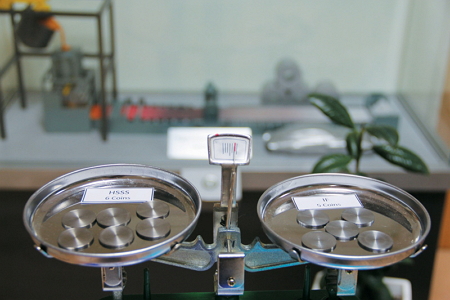The research team of POSTECH (President Kim Yong Min) has developed new steel materials capable of challenging the position of titanium for the first time in the world.
The new steel materials can significantly improve the gas mileage of automobiles by reducing their weight by 15%, as well as being twice as stretchable as titanium with 1/10th of the production cost. Such benefits are giving these new materials a high profile in the industry. The development of these new materials represents the product of successful collaboration between academia and industry on research into intermetallic compounds, which are hard but brittle, making them difficult to use as structural materials.
A research team led by professor Kim Nak Joon, with Kim Han Soo and Kim Sang Hun, who is studying for a doctoral degree in the Steel Graduate School in POSTECH, developed a low-density steel that combines excellent strength and softness with low weight thanks to its use of intermetallic compounds.
This research is published in Nature, one of the world?s most foremost academic journals, and it has already attracted extreme academic interest due to its production method and applicability. The publication of metal material related research in Nature is unprecedented, as it the journal is predominantly orientated towards core science. It is also represents the first time an article by a Korean research team has been published in Nature in this field.
Automotive manufacturers have been seeking to lighten the car body through the increased use of lightweight alloys such as aluminum, rather than steel, which has a high density. That?s why there is considerable research ongoing into the manufacture of aluminum through the alloy process to reduce density and increase strength.
However, reducing density through an increase in aluminum content within steel leads to the creation of intermetallic compounds, which has the disadvantage of making the steel rather easy to break. The research team led by professor Kim Nak Joon and Kim Han Soo applied reverse logic, using a small sized intermetallic compound which is not able to break. This allows the stopper to stop the movement of electric potential within alloy when an outside force is applied. Reducing intermetallic compounds to an extremely small size, making them hundreds of nanometers in size, allows them to be evenly distributed within the alloy. This innovation effectively turned the intermetallic compounds from being an obstacle to strengthening to enabling an increase in strength.
These new materials provide 50% enhanced strength with features that are light and soft. This means they are not easy to break when transforming compared to other low-density materials which have been studied in the past. In particular, although its strength is similar to titanium, which has been well known for strong strength, it is nevertheless lightweight, making it much more economical than titanium, with a production cost that can be reduced by as much as 90%.
The research team said if these materials are used for automotive steels, car bodies can be made more lightweight to increase fuel mileage and reduce engine exhaust gases. Furthermore, they predict the development of a new ?automobile of the future? with enhanced passenger safety and remarkable strength. The research is groundbreaking in the way it challenges the status quo that links the better fuel mileage of lightweight automobiles with poorer safety.
Professor Kim Han Soo said ``This newly developed materials can be produced using existing steel manufacturing facilities. This means they can be applied in sectors such as shipbuilding and civil engineering where lightweight materials are an absolutely necessity.``
This research has been carried out for the past four years with the support of POSCO?s ?Steel Innovation Program?. The ?Steel Innovation Program? is a project which has been carried out by POSCO and POSTECH in order to train excellent personnel in the steel sector as well as construct a basis for dedicated steel research.
This research filed an international patent in 2013, and the newly developed materials are currently scheduled for pilot production at the Pohang Steel Mill in order to find out whether it is possible for mass production.
- Production cost is only 1/10 compared to that of titanium, offering the potential to lighten automotive weight by 15%
- Research by the POSTECH research team is being used in a pilot production at the Pohang Steel Mill.


